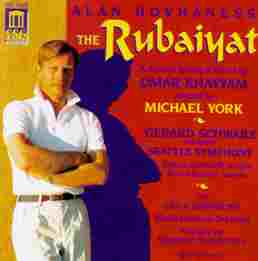A Musical Setting of Verses by Omar Khayyam

narrated by Michael York
The Rubaiyat
A Musical Setting of Verses by Omar Khayyam
narrated by Michael York
Gerard Schwarz, conductor
Seattle Symphony
Diane Schmidt, accordion
Ron Johnson, marimba
Program:
Mediation on Orpheus, Op. 155
Fantasy on Japanese Woodprints, Op. 211
Total Time: 59:53
Released in 1995
Label: Delos International Inc.
Hollywood & Vine Plaza
1645 North Vine St, #340
Hollywood, CA 90028
Review by Henry Doktorski:
"The Rubaiyat conjures up the spirit of ancient Persia in the time of the revered poet and sets his immortal lines in a framework of musically haunting images that evoke the fragility of life and of love - the fragility of everything, except fate. By the interweaving of narration, orchestra, and accordion, the composer demonstrates that the imperishability of the poetry is matched by the inevitability of the music," - Tom Carlson, from the liner notes of the world premiere recording by Andre Kostelanetz and the New York Philharmonic released on Columbia Masterworks in 1977.
Now, nearly two decades later, "The Rubaiyat" has finally been recorded a second time, in this case on the Delos label, and it is every bit as expressive and exciting as the first recording, which featured Douglas Fairbanks Jr. as narrator and Carmen Carrozza as accordionist.
I was, at first, tempted to compare the two recordings, (on the whole Douglas Fairbanks narrates with more passion and drama than Michael York, and Diane Schmidt's accordion seems to have a sweeter and more mellow sound than Carmen Carrozza's) but after listening to them one after another, I concluded that both recordings, although distinctive in flavor, (actually there are some minor musical revisions in the score) are also remarkably similar to each other.
For example, the original Kostelanetz recording is 13 minutes 52 seconds long and the Schwarz recording is 13 minutes 51 seconds long! This seems to indicate that both conductors took great pains to carefully follow the directions of the composer. Alan Hovhaness himself was present at the recording sessions of the recent Delos release and assisted in preparing the disc.
Alan Hovhaness, born in 1906, professes a strong dislike for serial music and other types of modern music that he describes as "machine music." He is firmly convinced that for music to be accepted and successful, it must be tonal and melodic. "People must get pleasure out of music. It must sound good." (interview with Daniel A. Binder)
The accordion is the featured solo instrument in the work and is blessed with many beautiful melodies, some gentle and lyrical and some driving and rhythmic. Many are derived from modes and seem to have a middle-eastern origin. Ms. Schmidt plays her part superbly and is prominently mentioned in the CD booklet. She received her Masters in Music in composition at the University of Washington and presently teaches theory and composition through the Seattle Community College system.
She won the World Accordion Competition (classical) in 1971, against a field traditionally dominated by Russians and Europeans. She has performed with Luciano Pavorotti and with chamber music groups such as the Philadelphia Quartet. She also recorded the Paul Creston Concerto for Accordion and Orchestra with the Seattle Youth Symphony.
"The Exile Symphony," Hovhaness' first symphony (1936) was inspired by the tragic plight of the Armenian people who endured severe persecution in Turkey in the 1930s and were forcibly exiled. One hears Oriental influences in the modal tonalities.
"Meditation on Orpheus" is a rather dark work which depicts that part of the Orpheus legend that describes the Greek hero's descent into the underworld in search of his deceased wife, which results in his own subsequent death. The piece includes ominous gongs, rippling harp, throaty bass of growlings, a rush of wind created by the strings playing fast random passages, and a fearsome crescendo for the brasses at the conclusion.
"Fantasy on Japanese Woodprints" Op. 211 (1965) evokes mystical atmospheres of the Far East with microtonal slides, pentatonic scales and the delicate use of the marimba, expertly played by Ron Johnson, marimbist for the Seattle Symphony for 30 years. A very memorable section of the piece for me is the oboe and clarinet solos about halfway into the work, which are note-for-note direct quotes from the second movement of Hovhaness' "Suite for Accordion" Op. 166 written in 1959! Composers frequently borrow themes from other pieces, even by other composers, and Mr. Hovhaness is no exception.
This fine recording is a delight to listen to and I recommend it for all classical accordion lovers.
Date: Fri, 18 Jun 1999 00:17:03 +0000
From: Bernd Kammerer -- mubomail@t-online.de
Subject: Fine!
Hi there!
The Henry Doktorski-Review on Hovhaness' "Rubaiyat" was a great pleasure for me to read. Mr. Doktorski gives a straight and conclusive impression of this extraordinary work by Alan Hovhaness.
By the way: I am a German music-critic, very interested in - and of course touched by - the work of Alan Hovhaness. In Europe, Hovhaness was nearly unknown until the early Nineties. Now there is finally a slightly increasing interest for this great composer and truly outstanding, unique genius of music.
My best regards - Thank you, and my best wishes for your site...
Bernd Kammerer
| About The Free-Reed Review |
| Invitation to Contributors / Submission Guidelines |
| Back to The Free-Reed Review Contents
Page |
| Back
to The Classical Free-Reed, Inc. Home Page |